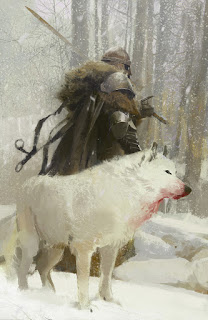“Hard words break no bones.”-Hen Thorir's Saga, c.13 by Mark Hatmaker
 Here we have the Viking equivalent of “Sticks and
stones may break my bones, but names will never hurt me.”
Here we have the Viking equivalent of “Sticks and
stones may break my bones, but names will never hurt me.”It is telling that the advice has been around for centuries in many iterations and yet we still have need to remind ourselves of it because, to be frank, many of us still equate words with acts.
Insults with blows.
Hot air with tangibles.
The wise warrior sees acts as facts and all words as vaporings until they manifest into an act.
All utterings unless or until expressed in an action are essentially valueless, be the words expressed hard, soft, impressive, or loving.
My stated New Year’s Resolutions not acted upon are lies, my expressions of love backed by indifference or apathy in a relationship are the same. My insults or threats may very well be akin to the impotent bluster of the spoiled brat.
The wise warrior hears words of all categories, but he only heeds words from individuals with a track record for actions.
The friend who is there when she says she will be there, has proven via repeated acts that their word is indeed a bond to a committed act.
The “friend” whose commitment is always voiced but never evidenced, needs far less heeding.
Hard Words deserve the same culling. We must look behind the hard words to who is uttering to decide if we need pay heed.
Louis L ’Amour etches the difference between hearing and heeding in his short-story “War Party” where the gossip concerning a young widow traveling without a man in a wagon train soon draws hard tongues.
Time to time the men had stopped by to help a little, but next morning nobody came by. We got lined out about as soon as ever, and ma said to me as we sat on the wagon seat, “Pay no attention, Bud. You’ve no call to take up anything if you don’t notice it. There will always be folks who will talk, and the better you do in the world the more bad things they will say of you. Back there in the settlement you remember how the dogs used to run out and bark at our wagons?’
“Yes, ma.”
“Did the wagons stop?”
“No, ma.”
“Remember that, son. The dogs bark, but the wagons go on their way, and if you’re going someplace you haven’t time to be bothered with barking dogs.”
Now there is a flip side to “Hard words break no bones” one seldom considered.
If we are supposed to be salved or accept consolation from ignoring hard words, we often forget this when we offer our own hard words.
Whether these words be insults, or professions of just how bad-ass we are or perhaps responding to this little essay with “Not me, I’m never bothered by hard words.”
Dog-trainers know to watch a barking dog, but it’s the dog that has progressed beyond the barking stage to something eerily quiet that is to be truly heeded.
The fearsome one is not the loudmouth at the pool table, it is the quiet one with the 1000-yard stare at the end of the bar that needs watching.
The good warrior is a quiet stalking warrior.
The good warrior seeks consistency in thought, word, and deed
If we are wise enough to shake our heads while ignoring the yipping chihuahuas, we should also be wise enough to not add to the barking.
“Warrior er bitinn hans, ekki gelta hans.”
“A Warrior is his Bite, not his Bark.”

Comments
Post a Comment